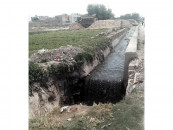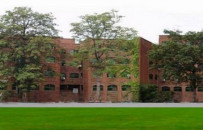Crime rate continues to skyrocket
Experts claim the introduction of Turkish, Chinese training models has failed to improve surveillance

For a state like Pakistan following a post-colonial state structure, foreign models of bureaucratic functioning are held at a highly idolized stature, with the armed forces regularly introducing their personnel to these advanced training and organizational styles however, the contextual irrelevance of these imported policing techniques within major cities has prevented any significant improvement in the overall crime rate in Punjab.
Despite the Punjab Police strictly adhering to the Pakistan Penal Code Act of 1860 and the Code of Criminal Procedure 1898 alongside adopting the training models of various countries across the globe including Turkey and China, the crime rate in the core province has continued to increase with each passing day.
According to details obtained by The Express Tribune, the rate of incidence of crimes like theft, robbery, mobile snatching, kidnapping for ransom, and sexual violence has observed a 15 to 30 per cent spike during the past five years across multiple cities in Punjab, with Lahore ranking number one with the highest number of reported cases, followed by Gujranwala, Sheikupura, Multan, Faisalabad, and Rawalpindi.
Read: Capital sees spike in street crime
“Until or unless the police station culture improves, no training model in the world can improve the efficiency of the police and curtail the crime rate. When our officers go to Turkey, China or England for a vocational tour, they are trained according to the population demographics and social realities of those individual countries.
Upon returning home, these officers are unable to apply those same policing styles in our context, which has its own peculiarities vis a vis crime and social instability,” emphasized Ahmed Naseem, former Inspector General Punjab Police, who further opined that importing training models was a futile attempt at improving policing.
Expanding on Naseem’s postulation, Dr Azhar Hassan Nadeem, Professor of Criminology at the Lahore School of Economics (LSE) felt that addressing the root causes behind the growing rate of crime was indispensable for any significant improvements to be made.
“Intolerance and anger issues are highly common in our society today. Moreover, the growing inequality between the classes in terms of resource distribution has further propelled this resentment,” asserted Dr Nadeem, who implored the government to introduce anger management and mental help seminars in educational institutions alongside offering counselling services to criminals inside police stations in order to decrease the incidence of crime.
“Simply switching between various policing models is definitely not going to help tackle the crime rate,” he added.
Dr Nadeem’s conjecture is supported by evidence which indicates that the Punjab Police has adopted a multiplicity of foreign policing models over the past 25 years, switching frequently between the models of countries like Scotland, England, Peru, Turkey and most recently China.
Furthermore, during the past 10 years, special protection units like the Dolphin Force and Safe City Authority also came into being, in the hopes of improving the law-and-order situation in the metropolitan cities but all these efforts seemed to have been in vain.
Speaking to The Express Tribune on the matter, Salahuddin Ahmed Khan Niazi, former additional Inspector General Investigation at the Punjab Police conceded to the claims that despite the expansion of the police, the crime rate had not reduced. “There was a time when there was only one Punjab Police, but now there are more than 15 wings.
Where expansion of the police has raised its expenditure on salaries, the crime rate has not been reduced. Copying foreign policing models will not work in Punjab, where crime is growing uncontrollably,” declared Niazi.
Published in The Express Tribune, January 16th, 2024.



















COMMENTS
Comments are moderated and generally will be posted if they are on-topic and not abusive.
For more information, please see our Comments FAQ